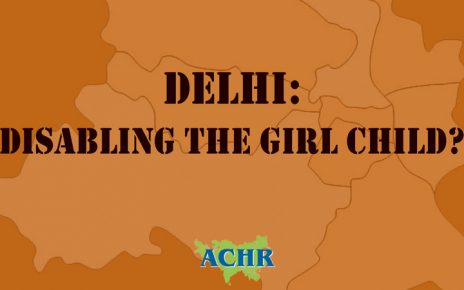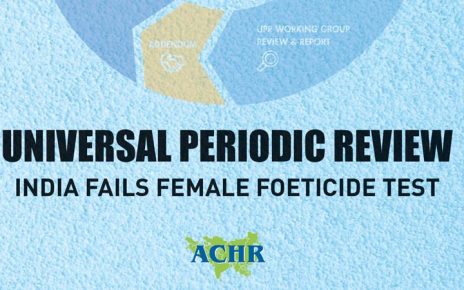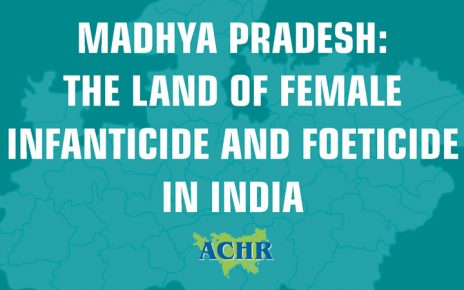Among the States and Union Territories (UTs) of India, Punjab has the second worst record of Child Sex Ratio of 846 girls per 100 boys and third worst record in skewed sex ratio of 895 females per 100 males as per Census 2011. The CSR of Punjab has consistently decreased from 908 in 1981 Census to 875 in 1991 Census (i.e. decrease by 33 points) to further 798 in 2001 Census (i.e. a decrease by 110 points compared to 1981 Census). The only silver lining is that Punjab has increased its CSR from 798 in 2001 Census to 846 in 2011 Census (i.e. increase of 48 points) and its sex ratio from 876 in 2001 to 895 in 2011 (i.e. increase of 19 points). It is however far behind to reach its 1981 level of 908 CSR when impacts of modern technologies like ultrasound and amniocenteses technologies were minimal. Despite the recent improvement, Punjab is still far behind to that of the national sex ratio of 943 and national CSR of 919, as per Census 2011.
The Census of 2011 suggested that as a religious group Sikhs indicated higher preference for boys and rampant use of sex selection techniques. The religion-wise data of Census of 2011 stated that Sikhs with 903 females against 1,000 males had the worst sex ratio followed by Hindus (939 females/1,000 males), Jains (940 females/1,000 males), Muslims (951 females/1,000 males), Buddhists (965 females/1,000 males) and Christians had the best sex ratio with 1,023 females for every 1,000 males.
Yet, there is little seriousness on the part of the Government of Punjab to address female foeticide leading to skewed sex ratio which is evident from lackluster implementation of the girl child retention schemes.
First, the Balri Rakshak Yojana (BRY) which was launched in the year 2005 in the backdrop of sharp decline in child sex ratio from 875 in 1991 to 798 in 2001 and sex ratio from 882 in 1991 to 876 in 2001 has been a total failure. Due to stringent and irrational eligibility conditions (like two-child norm without male child, compulsory family panning by parents, and family should be non-income tax payee till the girl child attains 18 years of age etc) failed to appeal even to the poorest of the poor. The impact of the scheme was so limited that only 650 families were registered/enrolled in nine years and the scheme had to be stopped abruptly in 2014. In contrast, the health scheme which replaced the BRY to provide free medical treatment to girls under the age of 5 years has already enrolled 50,000 families within two years since 2014.
Second, prior to the BRY, Punjab government had been implementing the Kanya Jagriti Jyoti Scheme (launched in 1996-97) and the Nanhi Chhaan (launched in 2008) targeting the poorest of the poor. But these schemes were poorly implemented and finally had to be merged in a new scheme called Bebe Nanaki Ladli Beti Kalyan Scheme (BNLBKS) w.e.f. the year 2011-12. The BNLBKS targeted only those families having an annual income of maximum Rs 30,000/- and covered under Atta Dal Scheme. The scheme had limited impacts. As of 18 May 2016, there were reportedly 28 lakh families comprising 1.13 crore people covered under the Atta Dal Scheme in the state to receive subsidized food grains but only 26,875 beneficiaries were enrolled under the BNLBKS as of 29 April 2015.
Third, the funds allocated to the girl child related schemes were lying unused which showed the non seriousness of the state government. According to the Comptroller and Auditor General of India (CAG), the Department had spent only Rs 55 Lakhs (i.e. 22%) out of total Rs 249 Lakhs allotted during 2006-07 to 2013-14 under Balri Rakshak Yojana. The Department failed to utilize Rs 45.93 Lakhs during 2005-06, Rs 32.61 Lakhs during 2006-07, Rs 7.48 Lakhs during 2007-08, Rs 18 Lakhs during 2009-10, Rs 35.68 Lakhs during 2011-12, Rs 44.55 Lakhs during 2012-13, and Rs 70.58 Lakhs during 2013-14. Under Bebe Nanaki Ladli Beti Kalyan Scheme, the Department of Social Security and Development of Women & Children has spent only Rs 5780.47 Lakhs (i.e. 54%) out of Rs 10750 grants allotted by the 13th Finance Commission during 2012-13 to 2014-15. The Department failed to utilize a total of Rs 4970 Lakhs including Rs 2375 Lakhs during 2012-13, Rs 1117.07 Lakhs during 2013-14 and Rs 1477.46 during 2014-15. Similarly, the CAG has found that the “Awareness Programme for Improving Adverse Sex Ratio” was not properly implemented and against the budget provision of Rs 4 crore, only Rs 1.46 crore was spent during 2009-14. During test check of record of Director, Social Security and Welfare of Women and Child it was noticed that against the proposed 530 camps and 18 seminars, the department organized only 418 camps and 2 seminars during 2010-11 and 2011-12 in spite of the availability of the funds of Rs 55.03 lakh.
Fourth, the government of Punjab might have launched country’s first public health helpline to check female foeticide in October 2009, but due to lack of promotion of the helpline by the Department of Health and Family Welfare, the helpline eventually turned out to be a damp squib and stopped receiving any complaint one year after it was started with much fanfare. Finally, on 24 June 2014, the Punjab government replaced the foeticide helpline with a round-the-clock “Medical Helpline 104” which related to general complaints regarding health services.
Given the facts that all the schemes namely the Balri Rakshak Yojana, Kanya Jagriti Jyoti Scheme, Nanhi Chhaan and thereafter Bebe Nanaki Ladli Beti Kalyan Scheme (BNLBKS) have failed, the retention of girl child equally depended on the robust implementation of the Preconception and Pre-Natal Diagnostic Techniques (Prohibition of Sex Selection) Act, 1994 and the MTP Act. There are regular reports of sex selection but cases registered are few and cases resulting into conviction are fewer.
The National Crime Records Bureau (NCRB) under the Ministry of Home Affairs reported registration of 191 cases of foeticide in Punjab during 2006 to 2015. However, prosecution under the PC&PNDT Act is quite low in Punjab. Against 938 cases of suspension /cancellation of registration of ultrasound centres for violation of the PC&PNDT Act, only 147 cases/complaints have been filed so far in the courts/FIRs as of September 2016, according to the Department of Health and Family Welfare of Punjab. The Department of Health and Family Welfare claimed that out of these 147 cases, 92 cases were disposed off (acquitted), 31 cases resulted in conviction and 24 were still pending in district courts. However, an analysis by the Asian Centre for Human Rights of the data provided by the Department of Health and Family Welfare of Punjab found that out of 147 cases, 103 cases or 70% resulted in acquittal of the accused, 18 cases (or 12%) resulted in conviction of the accused, one case was mentioned as “decided” while 25 cases were pending.
The Minister of State, Ministry of Health and Family Welfare, Smt. Anupriya Patel in Unstarred Question No. 1116 answered 21 July 2017 in Lok Sabha stated that as per Quarterly Progress Reports (QPRs) ending March 2017, Punjab reported 31 convictions under the PC&PNDT Act. Of these, only one medical license was suspended, while 135 cases were pending in various courts of the State.28 The QPR ending September 2016 also showed 31 convictions and one suspension of medical license by Punjab Medical Council in the State, whereas 193 cases were pending in various courts in the State during the given period.29 In other words, there was no progress except that the pendency has decreased by 58 cases.
On 25 April 2017, the State Health Department issued instructions to put all ultrasound centres under 24×7 online surveillance while the police verification of doctors and other staff posted at such centres was made mandatory. Its impact is yet to be seen.
On the other hand, the MTP Act was also not implemented properly in Punjab. There have been numerous instances of female foeticide in the state. On 9 August 2006, the district health authorities unearthed a mass grave of over 100 female foetus in a pit located within the premises of the Sahib Hospital run by quacks Pritam Singh and his wife Amarjit Kaur in Patran, a town in Patiala district. The next day, i.e. 10 August 2006, the district health authorities discovered another pit, near the earlier one, in which about 200 to 300 female foetuses were suspected to be dumped within the premises of the Sahib Hospital, Patran.
Conclusion and recommendations:
Asian Centre for Human Rights recommends the following to the Government of Punjab:
Bebe Nanaki Ladli Beti Kalyan Scheme:
- Revise the Bebe Nanaki Ladli Beti Kalyan Scheme to increase the amount for post birth benefits of at least Rs. 1 lakh, provide educational scholarship of Rs. 50,000 and further additional financial assistance of Rs. 1 lakh to be paid to surviving girls for assistance during marriage;
- Expand the coverage of the Bebe Nanaki Ladli Beti Kalyan Scheme to include all girl children of Punjab irrespective of income of their parents or place of birth and benefits be provided to all the girl children in the family irrespective of whether they have male sibling or not and delink the scheme from Atta Dal scheme;
- Link the Bebe Nanaki Ladli Beti Kalyan Scheme with all Anganwadi Centres and Schools including the private schools where about 25% of the seats are required to be reserved for the economically weaker sections;
- Undertake specific programme for increasing coverage of all families under the Bebe Nanaki Ladli Beti Kalyan Scheme by connecting the programme with all hospitals/nursing homes/primary health centres; and
- Digitise the funds sanctioned and utilization certificates and upload the same in the website of the Department of Women and Child Development.
PC&PNDT Act:
- Establish PC&PNDT Bureau of Investigation under the Department of Health and Family Welfare to assist the appropriate authorities for effective implementation of the PC&PNDT Act;
- Launch a Mukhbir Yojana to reward those providing information with amount of rewards of at least Rs 200,000 to decoys andMukhbirs along with (i) specific incentive in the form of bond/scheme for the unborn baby of the decoy customer apart from undertaking of not aborting the foetus under any circumstances; (ii) specific allowance to the decoys and Mukhbirs to attend each hearing during the trials; (iii) ensure anonymity of the complainants, informers etc to the extent possible; and (iv) sanction adequate financial resources for implementation of the scheme in all the States and UTs;
- Introduce Integrated Monitoring system for PC&PNDT Act and installing tracking devices in all sonography machines;
- Ensure proper implementation of the PC&PNDT Act inter alia through: (a) ensuring efficient and effective system of registration of all ultrasound/ genetic clinics so as to ensure compliance to the provisions of the Act; (b) ensuring regular and effective inspection of the ultrasound/ genetic clinics for curbing the violation of Act & Rule; and (c) ensuring proper enforcement mechanism and taking appropriate action for violations of the provisions of Act.
- Ensure time bound trial of the cases under the PC&PNDT Act; and
- Make necessary budgetary allocations for implementation of all these measures.




